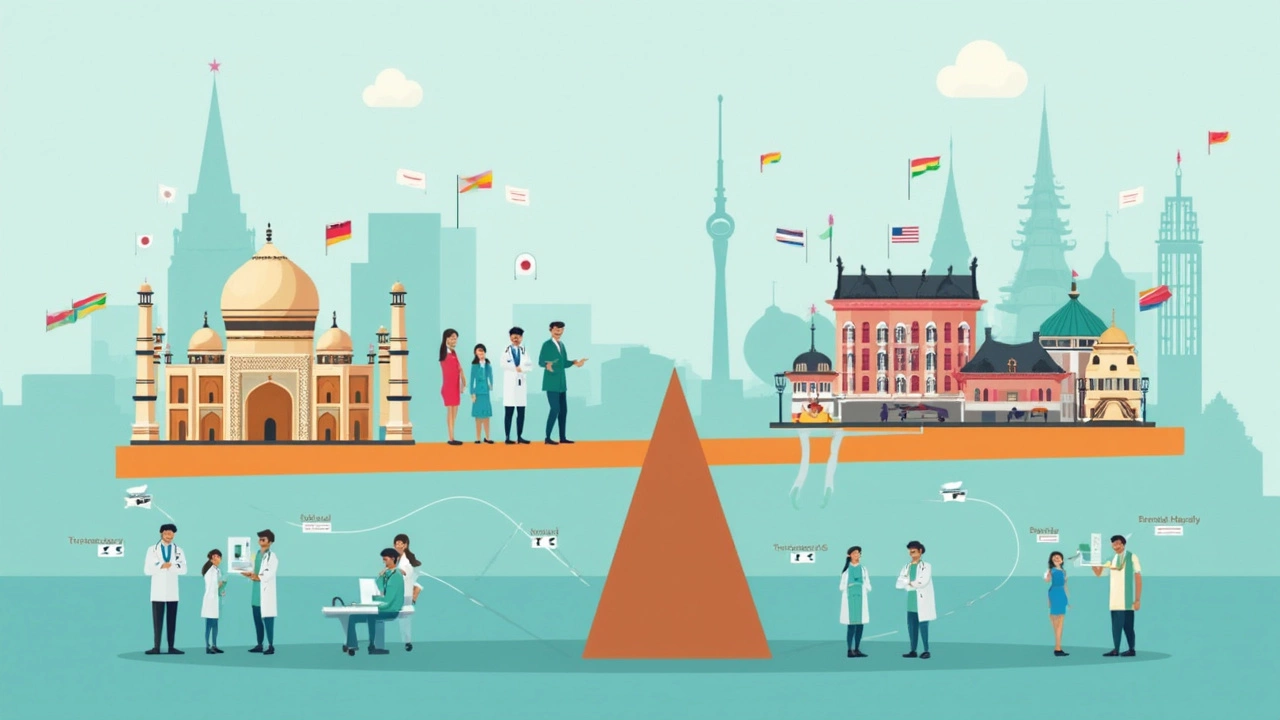- Home
- Medical Tourism
- Best Doctors in the World: Which Country Leads Medical Tourism?

Best Doctors in the World: Which Country Leads Medical Tourism?
Everyone brags about their country’s doctors, right? Problem is, most people don’t know what really sets top doctors apart—or where to find them. If you're thinking about traveling for surgery, therapy, or a second opinion, you want straight facts and not just rumors or adverts.
Different countries stand out for different reasons. Some lead in cutting-edge surgery, others have unbeatable cancer treatments, and a few are famous for affordable care without cutting corners. The secret? It often comes down to real results, where doctors are trained, the hospitals’ gear, and how happy past patients are. If you’re weighing up your options, you’re in the right spot. We'll get practical, so you can figure out what actually matters when picking a country for great care.
- What Makes a Doctor ‘the Best’?
- Top Countries with Renowned Doctors
- Real Stories from Medical Tourists
- Tips for Choosing a Country for Treatment
- Is It Worth Traveling for Medical Care?
What Makes a Doctor ‘the Best’?
People throw around the term “best doctor” a lot, but what does it actually mean? Is it about the number of degrees on the wall, the clinic’s fancy gadgets, or how many people line up outside the door? Turns out, there’s a mix of things that count when judging who really stands at the top.
- Training and Credentials: The best doctors often train at top medical schools and hospitals, which means they’ve seen a wide variety of cases and have been mentored by global leaders. For example, the United States, Germany, and the UK are known for tough, long training pathways which weed out all but the best.
- Outcomes and Results: Fancy diplomas don't matter if patients don’t actually get better. Countries with the best doctors usually collect solid data on patient recovery and survival rates. For example, Switzerland and Japan show some of the highest cancer recovery rates in the world.
- Experience with Complex Cases: It’s easy to treat a cold. But would you trust just anyone with brain surgery or a rare illness? Doctors working at top hospitals in places like Singapore or the US often handle tough, unusual cases every week.
- Access to Modern Tech: Doctors need the right gear, from MRI scanners to precise robotics. South Korea, for instance, is famous for its investment in medical tech for heart and transplant surgery.
- Communication and Patient Care: The best doctors actually listen and explain—not just rush you out the door. India’s top private hospitals get shout-outs for English-speaking, patient-focused care, which matters a lot if you’re traveling for treatment.
| Country | Average Doctor Training Years | Doctor-Patient Ratio |
|---|---|---|
| Germany | 11+ | 1:250 |
| United States | 10-15 | 1:350 |
| Japan | 10-12 | 1:480 |
| India | 8-11 | 1:1400 |
The title of “best doctor” isn’t just PR. It’s a mix of hard-earned skills, proven results, solid communication, and advanced equipment to back it all up. If you’re planning to travel, these factors can help you zero in on the right place and avoid nasty surprises.
Top Countries with Renowned Doctors
When it comes to best doctors and top hospitals, a few countries always make the shortlist. Each stands out for something unique—maybe surgical skills, research breakthroughs, or unbeatable patient care. Here’s where the buzz is actually justified.
- United States: The US is famous for its big-name hospitals like Mayo Clinic, Cleveland Clinic, and Johns Hopkins. American doctors get years of tough training, and the amount of funding pumped into research is unmatched. You'll see Nobel Prize winners in medicine mostly coming from here. High-tech surgeries and complex procedures—heart transplants, cancer treatments—often began in the US. But here’s the catch: care is pricey, so not everyone can afford it.
- Germany: Famous for precision and efficiency, Germany is a hotspot for people seeking orthopedic or spinal surgeries. Their surgeons are trained for years and hospitals use some of the world’s best medical tech. German healthcare is also known for following strict safety rules, so infection rates after surgery are super low.
- India: If you're after skilled doctors at a reasonable price, India leads the pack. Many doctors trained or practiced in the UK or US before heading back to India. The country is known for advanced heart surgeries and organ transplants—Apollo and Fortis are brands you’ll keep hearing about. The best part? Costs are often one-tenth of those in the US or Europe, and waiting times are short.
- South Korea: Think modern hospitals and high-tech procedures—especially in fields like cancer care and organ transplant. South Korean hospitals are also a hit for cosmetic surgery, drawing patients from all over Asia.
- Thailand: For medical tourism, Thailand is legendary. Hospitals like Bumrungrad International look more like hotels. Doctors often speak good English and are used to international patients. You can find solid care in everything from dental work to heart surgery—often at a fraction of Western costs.
- Switzerland: This place is luxury level. Private clinics in Geneva and Zurich attract royalty and celebs. Doctors here are known for their privacy, attention to detail, and state-of-the-art tech, but expect an eye-watering bill.
Here’s a quick look at where these countries shine:
| Country | Known For | Avg. Cost (USD) | Notable Hospitals |
|---|---|---|---|
| USA | Advanced surgeries, research, cancer care | High ($20,000+ for major surgeries) | Mayo, Cleveland Clinic |
| Germany | Orthopedics, cardiac care, strict standards | Mid ($10,000–$18,000) | Charité, Heidelberg |
| India | Heart, neuro, transplant, low cost | Low ($2,000–$6,000) | Apollo, Fortis |
| South Korea | Cancer care, organ transplants, cosmetics | Mid ($7,000–$15,000) | Samsung Medical Center |
| Thailand | Cosmetic, dental, general surgery | Low–Mid ($3,000–$8,000) | Bumrungrad |
| Switzerland | Private luxury, chronic care | Premium ($30,000+) | Hirslanden, Geneva Clinics |
Bottom line? There’s no single right answer. It all depends on what you need, your budget, and whether you want luxury or just solid results. But these are the countries people look at first when hunting for the best healthcare in the world.

Real Stories from Medical Tourists
It’s easy to get lost in online reviews, but nothing beats hearing what real people go through when they travel for healthcare. Take Emily from the UK—she needed a hip replacement and faced a long wait at home. She booked a surgery in India, where best doctors do thousands of these procedures each year. She said the hospital felt like a top private clinic back home, her surgeon spoke fluent English, and her total bill (including flights, stay, and aftercare) was cheaper than private surgery in London.
Then there’s Lucas from Brazil. He flew to South Korea for eye surgery—the kind of advanced laser treatment that only a few countries offer at world-class standards. He picked Seoul because the clinics there treat hundreds of international medical tourism patients a month. Lucas mentioned how the staff used high-tech tools he hadn’t even seen in Brazil and ran full after-surgery checkups before he got the all-clear to fly back.
Looking at the US, the Cleveland Clinic is famous among people from the Middle East and Europe. Patients come looking for complex heart procedures. The hospital reports that more than 5,000 international patients visit each year. Its team is used to handling even the trickiest cases, and doctors regularly top lists for heart care. If you’re thinking about flying far for surgery, it’s cool to know you’re not alone—thousands make the trip every month for a shot at the world’s best care.
If you want to look at the numbers, here’s a quick table showing where folks are going and for what treatments. Notice how certain countries stand out for specific procedures:
| Country | Popular Treatment | Typical Savings (%) |
|---|---|---|
| India | Orthopedic surgeries | 60–80% |
| South Korea | Eye & cosmetic surgeries | 40–65% |
| Turkey | Hair transplants | 65–75% |
| Thailand | Dental work | 50–70% |
| USA | Heart surgery | N/A (for advanced care) |
Bottom line: medical tourism isn't just about saving money. It’s about getting real quality from top countries and doctors with the right skills for your needs. The best way to know? Ask past patients, check verified data, and see what actually happens—not just what flashy websites promise.
Tips for Choosing a Country for Treatment
Jumping on a plane for a medical procedure isn’t as simple as picking the country with the most headlines. You need a practical checklist to find where the best doctors really are for your needs. Here’s how you can sort through your options:
- Look Up Hospital Rankings: Some countries have hospitals ranked among the world’s top ten by places like Newsweek or JCI. For example, Singapore General Hospital and Mayo Clinic in the US consistently make the list for specialized care.
- Check Doctor Credentials: Make sure your doctor has international board certifications or membership in respected medical associations. Hospitals often brag about these online.
- Specialties Matter: South Korea is famous for plastic surgery, India nails it with affordable heart surgeries, and Switzerland leads with cancer care. Go where your condition is the country’s specialty.
- Ask for Patient Reviews: Don’t just trust the glossy hotel-like hospital photos—dig into forums and social media for real stories from other medical tourists. Look for honest feedback about recovery, language barriers, and what went wrong, not just smooth experiences.
- Watch Out for Hidden Costs: Flights and hotels add up, and not all 'low cost' promises include medications, follow-ups, or emergency care. Ask for an all-inclusive quote in advance.
- Understand Insurance: Most regular health insurance won’t cover procedures done overseas. Some countries require visitors to buy special medical tourism insurance for emergencies—don’t skip this step.
- Language and Support: Choose countries and hospitals with staff who speak your language or offer professional translation. Miscommunication can cause real headaches when it comes to your health.
Want a quick comparison? Here’s how a few countries stack up on price and specialties for popular procedures:
| Country | Popular Treatments | Average Savings vs US |
|---|---|---|
| India | Heart, Orthopedic | 60-85% |
| Thailand | Cosmetic, Dental | 50-75% |
| Germany | Cancer, Neurology | 10-30% |
Take your time with research. Hospitals with the best doctors will be upfront about qualifications and will let you talk to previous patients. Ask questions, compare, and don’t rush into big decisions based on price alone. Safety and results should always lead your choice.

Is It Worth Traveling for Medical Care?
This is probably the most important question if you’re thinking about medical tourism. The answer really depends on what you need and what’s available where you live. Some folks travel for life-changing treatments; others just want to save money. But let’s break it down.
People travel for care for three main reasons: better quality, lower costs, or to get treatments they can’t find at home. For example, India and Thailand see thousands of visitors every year for heart surgery and cosmetic procedures—these countries offer high-quality care at a fraction of U.S. prices. In South Korea, folks fly in from Europe and the Middle East for world-class cancer care or advanced skin surgeries. Meanwhile, many from Canada or the UK travel for faster treatment because public systems mean longer wait times.
If you’re worried about quality, it’s smart to check hospital accreditations. JCI (Joint Commission International) is the gold standard—if a clinic or hospital is JCI-accredited, it meets tough global criteria. Another trick is to look at patient outcomes. For example, Singapore consistently ranks in the top ten worldwide for survival rates after complex surgeries. Here’s a quick snapshot:
| Country | Common Treatments | Avg. Cost (USD) | JCI Hospitals |
|---|---|---|---|
| India | Heart surgery, joint replacement | ~$6,000 | 40+ |
| Thailand | Cosmetic, dental, spine surgery | ~$10,000 | 50+ |
| Turkey | Hair transplant, dental, eye treatments | ~$4,000 | 30+ |
| Singapore | Cancer, cardiac, organ transplant | ~$20,000 | ~22 |
Ok, the costs look good, but don’t skip the travel logistics. Recovery abroad isn’t always easy. You’ve got to add up the airfare, hotel, possible follow-ups, and maybe even language barriers. Unexpected problems, like infections or complications, can also cost you in other ways. Make sure insurance covers you in the destination country—or buy separate coverage, since most national plans won't help you abroad.
- Ask your local doctor for advice; a second opinion can save you hassle down the road.
- Double-check travel requirements for your destination (some procedures need you to stay weeks or even months).
- Read reviews or join patient forums. Real experiences help judge whether it’s worth the jump.
- Plan for aftercare, not just the surgery—long flights home aren’t fun when you’re healing.
So, is it worth it? For a lot of people, yes—especially for big savings or life-saving treatments not available locally. But don’t rush it. Do your research and plan everything from start to recovery.

Arnav Singh
I am a health expert with a focus on medicine-related topics in India. My work involves researching and writing articles that aim to inform and educate readers about health and wellness practices. I enjoy exploring the intersections of traditional and modern medicine and how they impact healthcare in the Indian context. Writing for various health magazines and platforms allows me to share my insights with a wider audience.
About
Medical Resource Center India is a comprehensive online platform dedicated to providing reliable health information and medical resources in India. Explore a wide range of articles, tips, and advice on medicine, healthcare services, and wellness. Stay informed about the latest developments in Indian medicine and access valuable insights into maintaining a healthy lifestyle. Discover expert guidance and health solutions tailored for every Indian citizen. Your go-to destination for authoritative medical knowledge in India.








